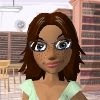I actually used to use
del.icio.us and really liked it. My two favorite aspects:
1) Tagging. I never liked the ways browser bookmarks could be organized. Important links were always getting lost, and I couldn't categorize a site in multiple ways. Tagging fixes all that.
2) Being able to share nicely. While it's often really helpful to follow strangers (with similar interests) around, being able to deliberately share discoveries with people I know is even better.
I later discovered (and honestly prefer)
diigo, which has most of the same capabilities and a lot of additional ones. It calls itself "social annotation" (as opposed to
del.icio.us' "social bookmarking"), and is particularly useful in a research context. You can tag and bookmark an interesting page, but you can also highlight and use sticky note comments all over that page. Yes, the dream of every student who hates wasting printer paper (or paying for printing). And you can choose to share (or not share) your contributions with other
diigo users visiting that page.
One downside: I found that
diigo was even trickier to use than
del.icio.us if you migrate among several computers. This drawback is the biggest reason I no longer use either tool on a regular basis...
bookmarkingresearchITSummer2.0




